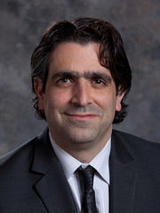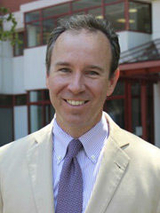A new scientific center at The Children’s Hospital of Philadelphia (CHOP) aims to harness and broadly share biomedical information to more quickly benefit child patients. The Center for Data Driven Discovery in Biomedicine (D3b) has the goal of advancing precision medicine—helping to match the most appropriate treatment to individual patients.

Much of its effort will target highly specific, even unique, biological abnormalities in childhood cancers, but the center will also focus on other rare pediatric diseases. The center will be the first of its kind with a pediatric focus.
“The genomics revolution ushered in by the first sequencing of the human genome early last decade is a watershed moment in discovery, opening up ever-growing paths to new disease treatments,” said Adam Resnick, PhD, an expert in brain tumors and founding director of the new center. “However, the challenge of ‘big data’ lies in accessing, harnessing and sharing this flood of information, especially for pediatrics.”

Phillip Storm, MD, division chief of Neurosurgery and the center’s co-director, elaborated on this theme: “Change is urgently needed in pediatric research, where territorial boundaries, scarce data, and limited technological infrastructures impede medical progress. Our center has a goal of developing new models for collaboration, data sharing and scientific integration.” Joining Resnick and Storm in the Center development efforts is Jena Lilly, MS, CCRC, the Center’s director of Operations and Strategic Planning.
Under its “open science” model, the center will drive the secure generation and integration of complex genomic and clinical patient data, and develop the open-access platforms that support collaborative discovery. Researchers worldwide will be able to access this information and work together to fully empower and share novel ideas and approaches for new biological targets for precise, less toxic clinical treatments on behalf of children.
Both directors have been committed to working with the White House and the federal Office of the National Coordinator for Health Information Technology (ONC) on the administration’s Precision Medicine Initiative. That initiative was further reinforced by the “Moonshot” cancer cures initiative announced in the 2016 State of the Union Address and by Vice President Biden’s Jan. 15 visit with cancer experts, including CHOP researchers, in Philadelphia. “The Vice President spoke of breaking down silos to bring cancer fighters together to share data and ideas,” said Resnick. “One of our major goals is to prioritize connectivity and collaboration over ownership of information.”
The CHOP Research Institute and CHOP’s Department of Biomedical Health and Informatics have jointly launched the D3b center. It builds on CHOP’s existing resources, such as its biospecimen and bioinformatics platforms (tumor and tissue samples, integrated with genomic sequencing data) and its tissue-based diagnostic program. It also draws on CHOP’s experience in leading multi-institutional research and clinical trial consortia, such as the Children’s Brain Tumor Tissue Consortium and the Pacific Pediatric Neuro-Oncology Consortium.
“In the 21st century, innovation mandates collaboration,” added Storm. “This not only includes our long-standing partnerships with other hospitals and researchers, but also countless foundations, and the patients and families themselves.”
“We are encouraged by examples of how other data-driven industries are entirely transforming sectors of the economy simply by harnessing the power of data through connectivity,” said Resnick. “Our center aims to apply this approach to biomedicine and use secure open-source, open-access models of discovery and information-sharing to streamline collaboration among national networks of clinicians and scientists, and facilitate new precision medicine approaches in pediatric treatments.”
Featured in this article
Specialties & Programs
A new scientific center at The Children’s Hospital of Philadelphia (CHOP) aims to harness and broadly share biomedical information to more quickly benefit child patients. The Center for Data Driven Discovery in Biomedicine (D3b) has the goal of advancing precision medicine—helping to match the most appropriate treatment to individual patients.

Much of its effort will target highly specific, even unique, biological abnormalities in childhood cancers, but the center will also focus on other rare pediatric diseases. The center will be the first of its kind with a pediatric focus.
“The genomics revolution ushered in by the first sequencing of the human genome early last decade is a watershed moment in discovery, opening up ever-growing paths to new disease treatments,” said Adam Resnick, PhD, an expert in brain tumors and founding director of the new center. “However, the challenge of ‘big data’ lies in accessing, harnessing and sharing this flood of information, especially for pediatrics.”

Phillip Storm, MD, division chief of Neurosurgery and the center’s co-director, elaborated on this theme: “Change is urgently needed in pediatric research, where territorial boundaries, scarce data, and limited technological infrastructures impede medical progress. Our center has a goal of developing new models for collaboration, data sharing and scientific integration.” Joining Resnick and Storm in the Center development efforts is Jena Lilly, MS, CCRC, the Center’s director of Operations and Strategic Planning.
Under its “open science” model, the center will drive the secure generation and integration of complex genomic and clinical patient data, and develop the open-access platforms that support collaborative discovery. Researchers worldwide will be able to access this information and work together to fully empower and share novel ideas and approaches for new biological targets for precise, less toxic clinical treatments on behalf of children.
Both directors have been committed to working with the White House and the federal Office of the National Coordinator for Health Information Technology (ONC) on the administration’s Precision Medicine Initiative. That initiative was further reinforced by the “Moonshot” cancer cures initiative announced in the 2016 State of the Union Address and by Vice President Biden’s Jan. 15 visit with cancer experts, including CHOP researchers, in Philadelphia. “The Vice President spoke of breaking down silos to bring cancer fighters together to share data and ideas,” said Resnick. “One of our major goals is to prioritize connectivity and collaboration over ownership of information.”
The CHOP Research Institute and CHOP’s Department of Biomedical Health and Informatics have jointly launched the D3b center. It builds on CHOP’s existing resources, such as its biospecimen and bioinformatics platforms (tumor and tissue samples, integrated with genomic sequencing data) and its tissue-based diagnostic program. It also draws on CHOP’s experience in leading multi-institutional research and clinical trial consortia, such as the Children’s Brain Tumor Tissue Consortium and the Pacific Pediatric Neuro-Oncology Consortium.
“In the 21st century, innovation mandates collaboration,” added Storm. “This not only includes our long-standing partnerships with other hospitals and researchers, but also countless foundations, and the patients and families themselves.”
“We are encouraged by examples of how other data-driven industries are entirely transforming sectors of the economy simply by harnessing the power of data through connectivity,” said Resnick. “Our center aims to apply this approach to biomedicine and use secure open-source, open-access models of discovery and information-sharing to streamline collaboration among national networks of clinicians and scientists, and facilitate new precision medicine approaches in pediatric treatments.”
Contact us
Cancer Center